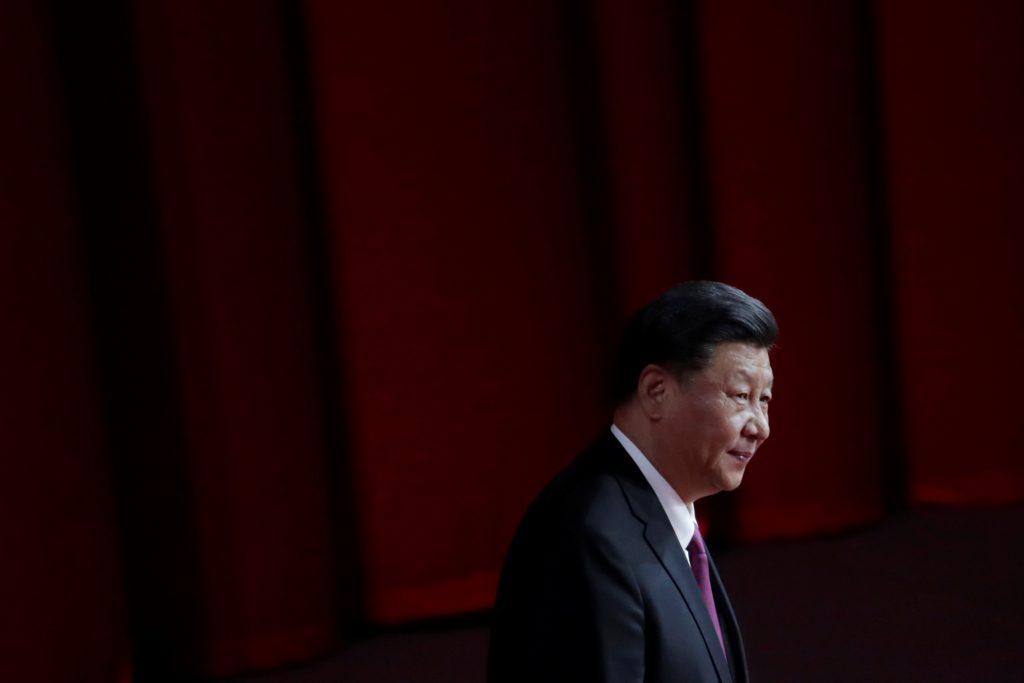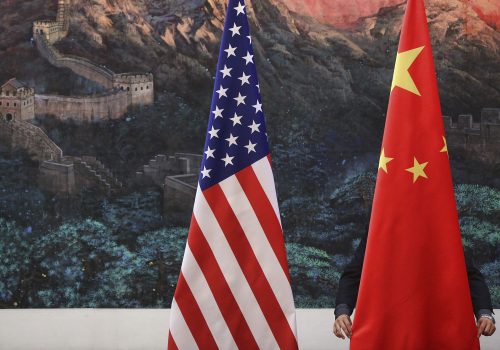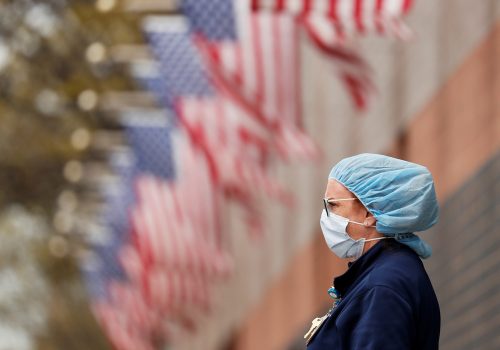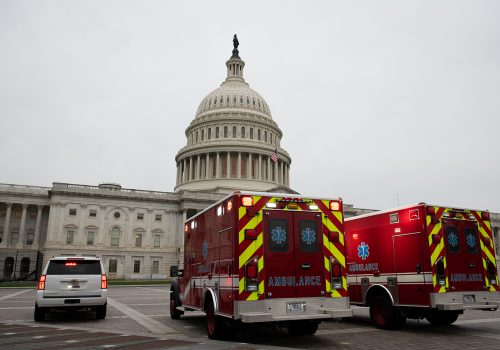You’ve got to thank the coronavirus for one big favor regarding China.
COVID-19 has provided a clarifying force revealing more clearly than ever before both the nature and relentlessness of the ruling Chinese Communist Party’s ambition to place itself at the center of global power and influence.
What once was an opaque policy, articulated by Chinese leader Deng Xiaoping, of “hide your strength, bide your time,” has now morphed into the transparent, if still unstated, approach by President Xi Jinping of “seizing the COVID-19 moment” – before it closes.
The virus first appeared to be a dramatic setback for China, given its role as the pathogen’s source and epicenter in January and February. With China’s likely emergence now as the first major world economy to end lockdowns and regain growth, COVID-19 now offers once-in-a-century chance to accelerate the geopolitical shift in Beijing’s favor through 2020 and far beyond.
That said, Chinese leaders are moving at a pace that reveals not only their ambitions but also their apprehensions that this historic moment could close as quickly as it opened.
Get the Inflection Points newsletter
Subscribe to Frederick Kempe’s weekly Inflection Points column, which focuses on the global challenges facing the United States and how to best address them.
“The party’s leaders believe they have a narrow window of strategic opportunity to strengthen their rule and revise the international order in their favor,” writes Lt. Gen. (ret.) H.R. McMaster, President Trump’s former national security adviser, in his just-released book, Battlegrounds: The Fight to Defend the Free World.
He sees the party leadership moving at warp speed to “co-opt, coerce and conceal” at home and abroad “before China’s economy sours, before the population grows old, before other countries realize that the party is pursing national rejuvenation at their expense, and before unanticipated events such as the coronavirus pandemic expose” their vulnerabilities.
At the same time, Beijing is wrestling with the new burdens of global leadership: demands from debtor nations for relief, from developing nations for accountability, from COVID-19 victims for reparations, and from the global human rights campaigners for less repression and more transparency.
Here are just four unfolding fronts in this unfolding drama:
1. CALLS FOR DEBT RELIEF
The Financial Times reported yesterday (Friday) that Beijing “has received a wave of applications for debt relief from crisis-hit countries included in the ‘Belt and Road Initiative’ (BRI).”
These will grow as the virus’s full force bears down on emerging markets. Of the 138 countries signed up to BRI, the vast majority are developing countries, many with dodgy credit ratings that are now growing worse.
What’s positive is that China signed on to a G20 agreement last month to freeze bilateral loan repayments for poorer countries until year’s end. Yet Chinese leaders remain far from forgiving principle or interest.
As the G20’s crucial July meeting in Jeddah approaches, more will be expected of China as the country that both morally and financially should be at the center of global fiscal stimulus and debt relief efforts.
2. U.S. TENSIONS AND CALLS FOR ACCOUNTABILITY
This week’s market-moving story that U.S. officials are exploring punitive measures against China over COVID-19 is likely just the beginning of demands that Beijing should adhere to the Spiderman admonition that “with great power comes great responsibility.”
The notion may seem far-fetched–or even counterproductive to U.S. interests–that the White House and Congress might act to remove China’s sovereign immunity so Beijing can be sued in U.S. courts for damages.
Whatever happens on that front, Beijing can expect increasing calls from the U.S. and beyond to investigate more thoroughly the origins and response to COVID-19, if only to avoid a repeat performance.
Secretary of State Mike Pompeo’s broadside this week on China for “classic Communist disinformation” on COVID-19 should be read alongside the drumbeat of increased, detailed reporting on what Wired Magazine–in its own rich investigative report–called China’s “Coronavirus coverup.”
3. CHINA’S PLAY FOR EUROPE
This week’s Europe-China controversy was triggered by a leak to Politico Europe about an apparent decision by the European External Action Service, under pressure from Beijing, to remove references from a report on China’s “global disinformation campaign to deflect blame for the outbreak of the pandemic and improve its international image.”
Josep Borrell, the de facto European foreign minister, insisted, “We have not bowed to anyone,” but he then added, “It’s clear and evident that China expressed their concerns when they knew the document was leaked…I’m not going to reveal how it was done because we don’t explain this kind of diplomacy.”
No stage is more significant than Europe to track China’s diplomatic offensive in providing COVID-19 assistance, to follow its growing investments in Europe, and to measure Europe’s growing discomfort with Beijing’s bullying and tech inroads.
That said, Europeans are weighing new doubts about Chinese intentions against growing perceptions over the United States’ diminished European commitment.
4. CHINA’S NEW GLOBAL TECH STANDARDS
With the world distracted by COVID-19, watch China’s expected release later this year of “Chinese Standards 2035.” Beijing’s intention is nothing short of setting the global norms for emerging technologies over decades to come.
“China Standards 2035 is to focus on setting standards in emerging industries,” write Emily de La Bruyere and Nathan Picarsic in TechCrunch. “High-end manufacturing, unmanned vehicles, additive manufacturing, new materials, the industrial internet, cyber security, new energy, the ecological industry… Having secured its foothold in targeted physical spheres, Beijing is ready to set their rules.”
What this approach underscores is how China’s approach to global leadership differs from that of the United States. While Washington typically tries to lead others from atop the international community, China’s aspiration is to “move closer to the center of the world stage,” in the words of President Xi.
What’s been most evident in recent weeks is that China is acting to shape the COVID-19 period and its aftermath with considerable focus and planning. At the same time, the U.S. response to China has been inconsistent, lacking in long-term strategy and close coordination with allies.
A future column will deal with what democratic countries could do to confront this challenge together. The first step, however, is to understand China’s recognition of this historic opportunity and what it is doing to seize the moment.
This article originally appeared on CNBC.com
Frederick Kempe is president and chief executive officer of the Atlantic Council. You can follow him on Twitter @FredKempe.
MUST-READS FROM A WORLD IN TRANSITION
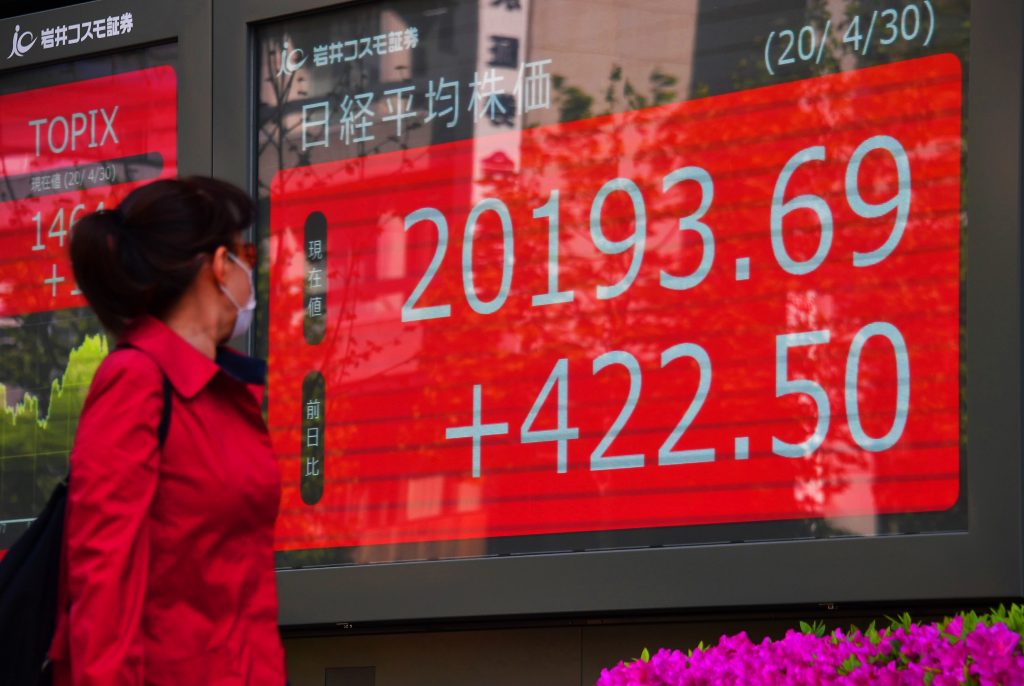
This week’s top reads focus on China.
Ben Steil and Benjamin Della Rocca in Foreign Affairs look at why China’s G20 debt relief commitments are “a mockery,” given that they won’t change low-income countries’ Belt and Road Initiative obligations.
Writing in The American Interest, Mitchell Reiss sizes up four reports on how the U.S. should approach today’s China. Paula Dobriansky in The Wall Street Journal and Gary Schmitt and Craig Kennedy in The American Interest look for solutions to U.S. dependence on Chinese supply chains.
This week’s must-read comes from Shawn Yuan in WIRED, where he reconstructs richly the first days of coronavirus in China from social posts that the regime censored and deleted.
Also don’t miss the last item from Bill Drozdiak in Politico from his new book, The Last President of Europe: Emmanuel Macron’s Race to Revive France and Save the World.
As always, I welcome your comments.
#1. CHINA’S DEBT RELIEF “MOCKERY”
Chinese Debt Could Cause Emerging Markets to Implode
Benn Steil and Benjamin Della Rocca / FOREIGN AFFAIRS
China signed on to the G20 pledge that obliged all its members to suspend debt repayments from low-income countries through year’s end, “but added caveats that make a mockery of it,” write Benn Steil and Della Rocca in Foreign Affairs.
Their reasoning: China is excluding the most important of those loans that are owed to it, namely the hundreds of credits extended through its Belt and Road Initiative (BRI) for infrastructure development. That means that if you are one of the 67-plus countries who have taken financing for more than 1,800 BRI projects–totaling an estimated $135 billion–you need not apply.
That’s hardly the spirit required. “By continuing to demand interest payments on the loans,” write the authors, “China will force poor nations to choose between serving debts and important essential goods such as food and medical supplies.” Read More →
#2. FOUR U.S. APPROACHES TO CHINA
Our China Problem
Mitchell B. Reiss / AMERICAN INTEREST
Washington has a fast-growing cottage industry of reports diagnosing the China problem and prescribing cures. Mitchell Reiss in the American Interest takes a close look at four of the best, whose bottom-line question is whether China “is a rising threat to be confronted boldly, or a manageable problem to be handled patiently.”
Though his prose is dense, Reiss is worth reading for the insights he provides from some of the genre’s most compelling authors: Ashley Tellis, Robert Blackwill, Nicholas Lardy, and Jude Blanchett. Taken together, their full reports are worth downloading and touch on all the most important bilateral, strategic, economic, and military aspects.
“It is not inevitable that China will continue to rise economically,” concludes Reiss, “that it will be able to casually resort to nationalism to distract public opinion from its failures, or that it will be able to indefinitely stifle or repress its citizens. At the same time, a rejuvenated and self-confident America … represents a tested and winning formula that will sustain U.S. leadership in a new century.” Read More →
#3. CHANGING CHINESE SUPPLY CHAINS
An Allied Plan to Depend Less on China
Paula J. Dobriansky / THE WALL STREET JOURNAL
One Concrete Way to Start Decoupling with China
Gary J. Schmitt And Craig Kennedy / THE AMERICAN INTEREST
Paula Dobriansky, a former U.S. official and Atlantic Council board member, lays out a plan in the Wall Street Journal for how the U.S. and its allies could address their over-reliance on China for supply chains for everything from medical supplies to auto parts.
She writes that the “optimal venue” for such a discussion would be the Quadrilateral Security Dialogue that brings together Japan, India, Australia, and the U.S.
“Washington and its partners in Asia should set up new supply chains, restructure trade relations, and start to create an international economic order that is less dependent on China,” she writes. “A multilateral ’coalition of the willing’ approach would better align trading ties with political and security relationships.” Read More →
Gary Schmitt and Craig Kennedy provide a different alternative to get more strategic about trade with China by “revitalizing the Committee on Foreign Investment in the United States – creating a CFIUS 2.0.”
“China is indeed a bad actor,” they write, “but it is also a global economic power from whom we cannot simply file for divorce. Concentrating our efforts on preventing another Huawei or another pharmaceutical crisis would be the start to a smarter and more feasible approach.” Read More →
#4. CHINA’S HIDDEN STORY
Inside the Early Days of China’s Coronavirus Coverup
Shawn Yuan / WIRED
Wired reporter Shawn Yuan richly details the early days of coronavirus in China through recovering social media posts that had been removed by the country’s censors and reconstructing the events around them.
“… these deleted posts offer a submerged account of the early days of a global pandemic,” he writes, “and they indicate the contours of what Beijing didn’t want Chinese people to hear or see.”
Two main kinds of content were targeted for the censors’ deletion: journalistic investigations of how the epidemic first started in late 2019 and “live accounts of the mayhem and suffering inside Wuhan in the early days of the city’s lockdown, as its medical system buckled under the world’s first hammerstrike of patients.”
Yuan commented on the relationship between the Chinese and their rulers in a post he typed into his Weibo account: “You are waiting for their apology, and they are waiting for your appreciation.”
He post was promptly removed. Read More →
#5. MACRON’S MORBID “MOMENT OF TRUTH”
Macron, the lonely Europeanist
William Drozdiak / POLITICO
Bill Drozdiak captures the French leader’s prophetic warning of a crisis that could undermine Europe in this Politico piece drawn from his new book, The Last President of Europe: Emmanuel Macron’s Race to Revive France and Save the World.
He paints a rich portrait of a youthful president “on the brink of despair… struggling in vain to persuade other European leaders to coalesce behind a strategic vision that would ensure Europe could defend its future interests in a resurgent big-power rivalry with Russia, China and the United States.”
In the operative quote, Macron told Drozdiak, “When the next major crisis occurs, we may not be ready. Empires and countries have disappeared in the past. The same thing could happen again. Before we know it, Europe could be obliterated.”
Writes Drozdiak, “Macron’s moment of truth for Europe has arrived with sudden and shocking morbidity.” Read More →
QUOTE OF THE WEEK
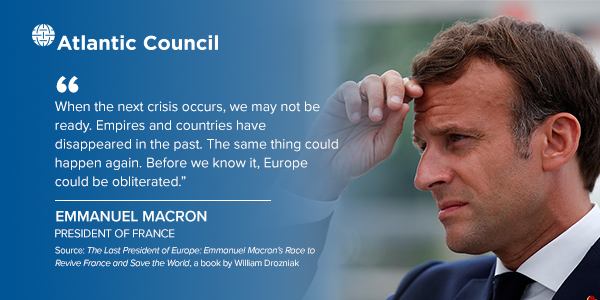
ATLANTIC COUNCIL TOP READS
Image: Chinese President Xi Jinping arrives for a cultural performance in Macau, China December 19, 2019, on the eve of the 20th anniversary of the former Portuguese colony's return to China. REUTERS/Jason Lee
